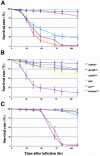The Drosophila caspase Dredd is required to resist gram-negative bacterial infection
- PMID: 11269502
- PMCID: PMC1083747
- DOI: 10.1093/embo-reports/kvd073
The Drosophila caspase Dredd is required to resist gram-negative bacterial infection
Abstract
The Drosophila innate immune system discriminates between pathogens and responds by inducing the expression of specific antimicrobial peptide-encoding genes through distinct signaling cascades. Fungal infection activates NF-kappaB-like transcription factors via the Toll pathway, which also regulates innate immune responses in mammals. The pathways that mediate antibacterial defenses, however, are less defined. We have isolated loss-of-function mutations in the caspase encoding gene dredd, which block the expression of all genes that code for peptides with antibacterial activity. These mutations also render flies highly susceptible to infection by gram-negative bacteria. Our results demonstrate that Dredd regulates antibacterial peptide gene expression, and we propose that Dredd, Immune Deficiency and the P105-like rel protein Relish define a pathway that is required to resist gram-negative bacterial infections.
Figures



References
-
- Anderson K.V. (2000) Toll signaling pathways in the innate immune response. Curr. Opin. Immunol., 12, 13–19. - PubMed
-
- Beutler B. (2000) Tlr4: central component of the sole mammalian LPS sensor. Curr. Opin. Immunol., 12, 20–26. - PubMed
-
- Chen P., Rodriguez, A., Erskine, R., Thach, T. and Abrams, J.M. (1998) Dredd, a novel effector of the apoptosis activators reaper, grim, and hid in Drosophila. Dev. Biol., 201, 202–216. - PubMed
-
- Engstrom Y. (1999) Induction and regulation of antimicrobial peptides in Drosophila. Dev. Comp. Immunol., 23, 345–358. - PubMed
MeSH terms
Substances
LinkOut - more resources
Full Text Sources
Molecular Biology Databases

